#ha ha i'm so funny
Text
nahida, irminsul, and representations of cognition throughout: an analysis
As the god of wisdom, it is probably intuitive that Lesser Lord Kusanali is depicted as someone omniscient, uber wise, indomitable in logic and without flaw of reasoning. More often than not, though, throughout the archon quest and story quests, we have been shown some of her shortcomings, from her lack of knowledge in certain aspects, and her susceptibility to certain forms of trickery. In this brief analysis we discuss aspects of human cognition and learning, and compare them to aspects from the story, providing evidence for the contrary—that, perhaps, there is no better representation of wisdom in the challenging nature of Teyvat than a god like her.

(Note: I do not claim to be any sort of expert in the topics I discuss here; this is merely a subjective analysis based on what I've learned of cognitive psychology and observed in canon. And, as with everything else I do, I did this simply because I was bored and I like overthinking things. Read at your own discretion.)
To me, Nahida, Irminsul, and Sumeru's stories are almost like this… super well crafted personification of working human intelligence itself. On a larger, fantastical scale, of course.
We know that the Irminsul is Teyvat’s repository of information—basically the brain. We know that Nahida is a branch of Irminsul, a part of that brain. And, well, this “brain” is actually represented in ways that are almost quite realistic, in many senses.
For starters: one of the most important functions of the brain is that it acquires information—that it learns. It accumulates knowledge, and while neurons do break down (and are not easily replaced, if ever), information is actually quite robust and does not “disappear” easily, besides the natural decay of time. There have been cases where people have lost part of their brains to accidents, yet retain their memories and even cognitive functions intact—the brain is actually far more malleable than one may think.
And in fact, you don’t “unlearn” things. You can’t “remove” things from your mind as easily as you imagine it—most of the time, when you “unlearn” or “extinguish” something, you really are just learning a new association that counters the old one. This new association takes time to develop, and spontaneous recovery often occurs—it takes time to “unlearn” something, or to “relearn” concepts. In life, we often have to correct our false preconceptions (not just in science!) and adapt to an ever-changing world—this constant process of unlearning and relearning and correcting is, essentially, what makes us “wiser”—the more we know, the more we understand. It is a constant growth of the mind.
Nahida, then, being the deity of wisdom who rules over all knowledge, is a form of being where regular learning processes in cognition are essentially amplified: there is no normal degradation of “memory” (as things are stored in Irminsul reliably); there is no loss of information, and yet Nahida is still able to learn new concepts and understand how they relate to the old ones, revise her understanding based on most recent evidence or events. Basically, she learns quicker than mortals with minimal risk of decay; she is a god, this element of hers (arguably) understandably exists.
But we also know: Irminsul itself is not perfect. We know that memories of Irminsul have, indeed, been deleted or altered. Of course this could easily be chalked up to the fantasy aspect outside of the analogy, but this could still be explained in terms of regular brain anomalies. Deleted memories could be analogous to memory loss in a sense (anterograde amnesia, cf. retrograde amnesia), while altered memories are, in fact, pretty common in real life—perhaps even more so than memory loss, for various reasons pertaining to heuristics, bias, and preconceptions—even though we tend to not realize it at all, unlike the glaring effects of memory loss.
Putting aside the why’s and how’s for now, memory loss is typically more noticeable than altered memory, but either way, the brain can actually accommodate for memory losses/alterations by bending to fit the “narrative” they previously had. The brain doesn’t like inconsistencies and gaps—it will try to explain something in the most coherent way possible with whatever available facts, which is actually a helpful adaptation to have in case we cannot obtain every piece of data we need. (The phenomenon is most common in terms of visual gaps, but is also prevalent with other senses and also with memory. For more, look up constancy bias.) Though, of course, in the case of memory loss or alteration, this isn’t necessarily a good thing. But in fact, this is what Irminsul does—it restructures itself accordingly with what facts are available, constructing a “coherent” narrative that, as we know, is false.
From this, we’ll be branching out to two points. The first is that Nahida’s existence aligns with this analogy in the sense that the removal of knowledge from Irminsul (of which she is an avatar of) is representative of the “weakening” or “shrinking” of the brain. As mentioned previously, this is not in the physical sense, for the case of the brain—but because Nahida is the physical representation of the abstract brain, then it makes sense that she shrunk during the eradication of forbidden knowledge. She lost all that knowledge gained—it would have mean her “growth” and “learning” has essentially reverted, hence she returns to a “younger” form of who she once was (see Nahida’s 2nd SQ) (though in act 5 of the AQ, it was Rukkhadevata splicing a branch off Irminsul itself, the image still stands that what’s left of the knowledge once forbidden knowledge has been taken away is not much).
Now what, exactly, forbidden knowledge is, we don’t know yet, but how it affects the brain would not be so much of a mystery—there are pieces of insightful or revolutionary findings that can influence plenty of one’s beliefs, or the way one sees and interprets the world, which would then change the way one process information and generates new thoughts in turn. For example, imagine that one day you wake up with the existence of “blue” gone from your mind. Nothing is blue to you—things that you would once call blue will look greenish-yellow to you, even the feeling of “blue” will simply be called “depressed”, or something else, but nothing in the world will be blue to you. That simple “removal” can change a lot of things from how you perceive to how you describe, which is why the effects of removing forbidden knowledge can take a huge toll, or at least a huge change, on Irminsul—hence the big metaphorical brain, hence Rukkhadevata, hence Nahida.
And second, what happened to “Irminsul” being perfect? We cannot call Irminsul a repository of “perfect” knowledge, i.e., that every information it contains is true to the core, because we know the information stored in Irminsul is faulty and malleable. In fact, Irminsul being “perfect” is with respect to its functionality as a brain, as a system. Theoretically, when exposed to true information, a perfect brain should contain only true information. But we know there are forces beyond Teyvat, ones that Irminsul inherently can’t capture/perceive (e.g. the twins). It’s like us not being able to understand a dolphin’s cries, or the color vision of a shrimp, or anything beyond three-dimensional vision—this is inherently the nature of Irminsul itself to not capture that information (with exceptions I'll come to later). Irminsul is still an essentially “perfect” functioning brain, but inherently not designed to capture that beyond its scope. Which then would make sense why it can be altered or robbed of memories in such a way that it would not “break”—it can self-regenerate, it can still function brilliantly. It thinks it functioning perfectly fine means it’s still intact, when in fact, it has been contaminated with false information without it even realizing.
Back again: this is very much like the brain, like human cognition. Because rational humans make judgment based on the available facts, this becomes a problem when your facts are wrong. Usually, with humans, there is a degree of confidence to which you would know whether what you know is right—but if you have a “perfect” brain like Nahida theoretically does, or at least a very highly functioning one, you would have little reason to question your brain. And that, is in fact, her pitfall.
As we've seen from Nahida's second story quest, because she doesn’t have all the facts, she has to make do with what she knows. And she still does that sufficiently, as her godly capabilities should allow. But she also makes decisions that quite mirror her old ones: wanting to eradicate the remnants of forbidden knowledge herself, willing to lose her power and revert her own evolution in favor of apep’s health. One would not make the same decisions if they’ve learned the catastrophic price for it—Nahida is, alas, uninformed now, so she proceeds to make the same mistakes. If it weren’t for the traveler, Nahida would have so easily fallen into the same rabbit hole again; this is what happens when you “erase” memories, or revert time—you are only bound to repeat old mistakes.
Here I’d also like to briefly mention that because the traveler did not have a good justification for stopping Nahida (they couldn’t, after all), it’s likely that Nahida would not “learn” why this was a bad idea, if not out of sole trust. As in, without the traveler’s continuous intervention, it is highly likely she would fall into this pitfall of her old mistakes one day… or would she?
Aside from her and Irminsul’s story being a very nicely fitting metaphor to the brain, she actually also represents cognitive strategies very well in her speech & personality, which solidifies in the metaphor very neatly. One major thing I'd like to point out is her constant use of analogy—which may sound like a gimmick or just a random personality trait. But in fact, in cognitive research, analogical reasoning has been shown to be a robust predictor of effective learning and success. So the fact that she often spits out seemingly random analogies out of nowhere isn’t just a random trait, but rather, a sign that she is constantly abstracting commonalities between distinct phenomena and learning about them effectively (in contrast to rote memorization).
This is, in fact, an incredibly important thing—as you might’ve already realized—because it combats the dependence on memorization, which we’ve seen is a problem given the inherent state of Irminsul and malleable memory! And we’ve seen these analogies play a very important factor in the progression of the AQs and SQs, like when she transcribed the truth about Scaramouche/Wanderer in form of a fairytale to preserve it from being lost to the void, or how forbidden knowledge was altered into a different form—the oozing stuff in the Chasm. This is such an important aspect of Nahida’s character because it shows that she understands that the power of transformation or abstraction transcends that of simple mass erasure, and can be used as a manner of preservation. Quite literally, the power of analogy was used to show Nahida’s expertise not only through merely being knowledgeable, but also through creativity, just as its role is in the world.
And most importantly, it does imply that she realizes the shortcomings of her “brain” aka Irminsul. (I hypothesize it’s either an effect of her memory loss (memloss on a wide scale, like retrograde amnesia, would show “loss” effects instead of adaptation, like the symptoms Nahida exhibited) or Dottore’s intervention of telling her about false skies, that makes her realize how much she doesn’t know.) Perhaps this, even, is what Rukkhadevata meant when she said “you will be a better archon than I”, because she already has ways of overcoming these past cognitive flaws as well. This—this realization that your brain can be functioning perfectly and still be flawed, exactly because of its perfect nature—this is the invisible yet solid distinction between being knowledgeable and being wise. And this is why Nahida is the god of wisdom, rather than just a library that contains every information in the world.
In sum: Irminsul and Nahida is a really nice representation, whether intentional or just by pure coincidence and overreach on my part, of a "perfect" functioning brain in a world of unreliable information, and Nahida's ability to abstract hidden symbols to preserve truths addresses this issue quite admirably. All of this nicely manifests in Nahida through little quirks that may be overlooked, but (I suspect) may be very significant to her character and the development of the future plot. Thank you I am Done

#source: trust me bro#can you Tell i'm a nerd#actually i wrote this a while ago while doing research but i was reminded of it after the recent ost album came out#damn am i gonna miss the sumeru arc and cast#i love my baby radish okay#character analysis#an-elle-ysis#ha ha i'm so funny#don't expect me to do another one this is the only subject in life i know enough to talk about unfortunately#genshin impact#原神#nahida#irminsul#sumeru#intelligence#cognitive psychology#cognition#learning#et cetera
23 notes
·
View notes
Text
had a fucking hilarious dream that tumblr replaced the "block" function with the far funnier "glock" function, which did the exact same thing except whenever anyone blocked you a random bullet hole, like a png of a bullet hole, would appear on your blog. discourse blogs were unreadable bc you'd go to the page and the sheer amount of bullet hole pngs stacked over the blogs obscured everything. I woke myself up laughing
#normally I don't chronicle my dreams here but fucking hell that one was funny#I think this would genuinely make tumblr better tbh#@ staff do this cowards#spy has thoughts#my life is a sitcom and i am my own laugh track#functional website#spy's smash hits#Glock function#edit for everyone in the notes saying 'everyone clapped'#I know I can't prove to you that it happened for real you're just gonna have to trust me on this#but I swear on my goddamn life I'm not making this up#I make so many conscious puns that sometimes my subconscious cooks up a real good one
192K notes
·
View notes
Text
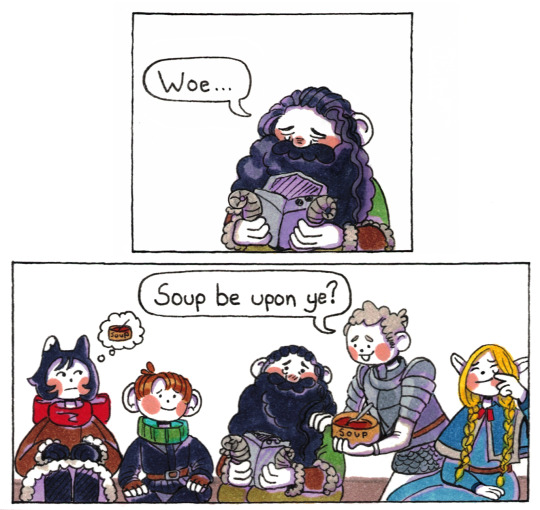
Soup solves everything.
#dungeon meshi#dungeon meshi spoilers#Senshi#izutsumi#chilchuck tims#laios touden#marcille donato#THE SOUP CHAPTER HAS BEEN ANIMATED#I have so many thoughts about senshi's backstory and how much that experience has shaped who he is.#This is such a powerful moment because it makes it clear how *stuck* senshi has been because of his trauma.#Up until now he has been a mystery! He's the chef guy! Don't worry about his apparent reclusiveness from society!#Don't worry about his intense need to make sure 'the young ones are fed'!#Senshi still has a lot of healing but this was the moment he could finally forgive himself.#This chapter is so important to me because sometimes you truly do need to face the most terrifying things to move past them.#This joke here is a bit too narrow to be funny for the masses...but mdzs fans know.#MDZS :handshake: Dungeon Meshi: Soup moment.#Laios and Jiang Yanli have a powerful magic call "Eat some soup and maybe you'll feel better'#That is also a spell you can cast upon yourself. Go eat some soup and you will feel better. Merry Soupmas everyone.#One more week of Thistle Thursdays....I'm not ready to say goodbye B*(
5K notes
·
View notes
Text
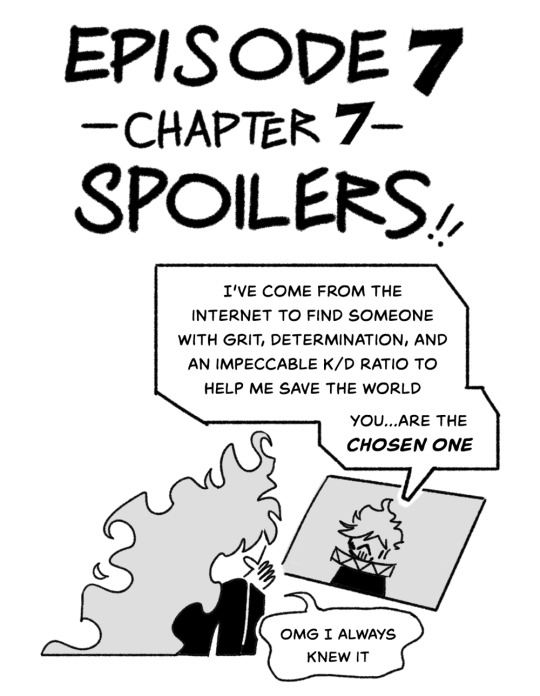
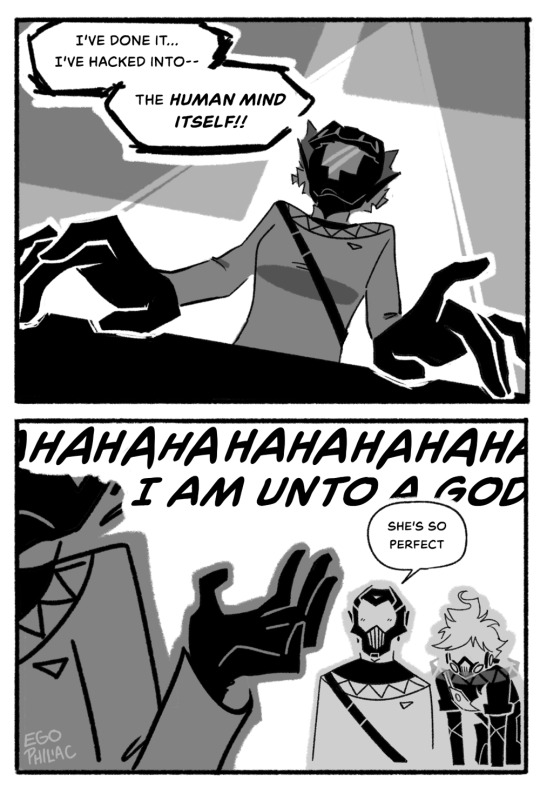
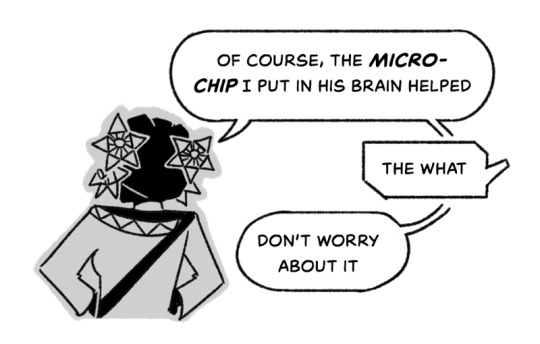
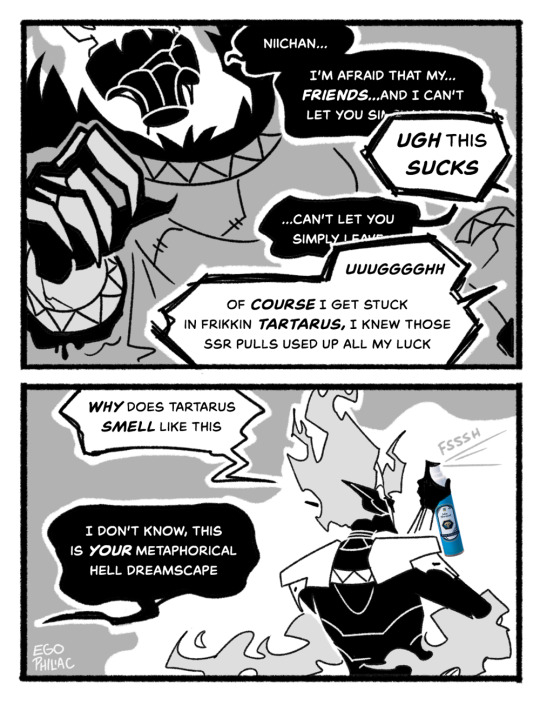
don't think I'm not still deep in the episode 7 brainrot. because OH BOY AM I
(also one more extremely, obnoxiously self-referential thing, I'm -- I'm so sorry)

#art#twisted wonderland#twisted wonderland spoilers#twisted wonderland episode 7 spoilers#twisted wonderland episode 7 part 7 spoilers#twisted wonderland book 7#twisted wonderland book 7 part 7 spoilers#and so ends the saga#(this time for real i promise)#malleus post-episode 7: shroud...i should have heeded your warnings...now tell me more about how i may hunt this elusive 'snipe'#alas poor puppies :( i'm glad they had a little aside about how they can fix them after this whole mess#let ortho have his dogs!#man i love that this has come down to malleus vs technology though#MY FAVORITE#ortho: you can destroy the shell that links me to this mortal world...but can you select the CORRECT DOWNLOAD LINK???#malleus: (downloads a billion viruses and dies instantly)#also i'm probably the only one who thinks idia complaining about his own mental tartarus prison is funny#but there we go#idia has two modes and two modes only#he's either in the middle of a metaphor where he finally forgives himself for his brother's death and takes charge of his own destiny#or he's like 'fuck yeah i'm about to get isekai'd into the internet! (immediately falls over making dying whale sounds)'#wait no he has a third mode: actively suffocating because silver and sebek won't stop squishing him#look he's just delightful no matter what's going on okay
4K notes
·
View notes
Text
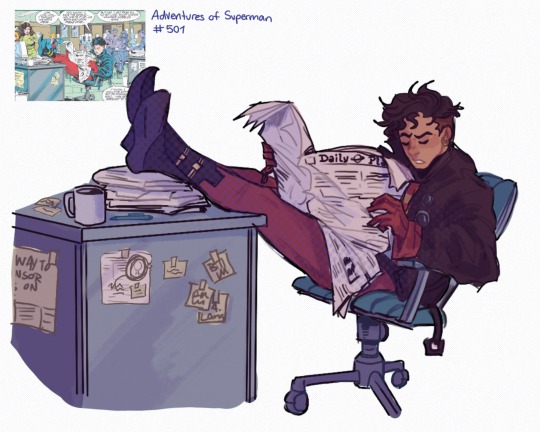
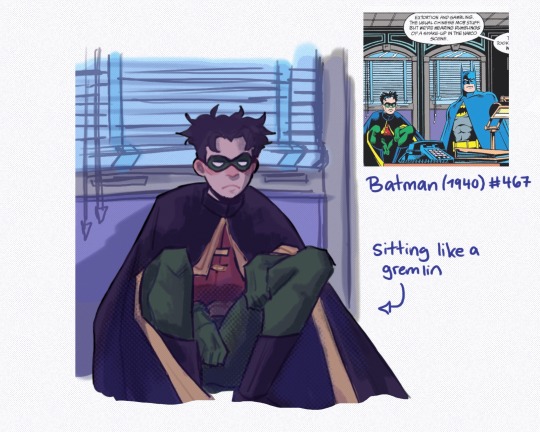
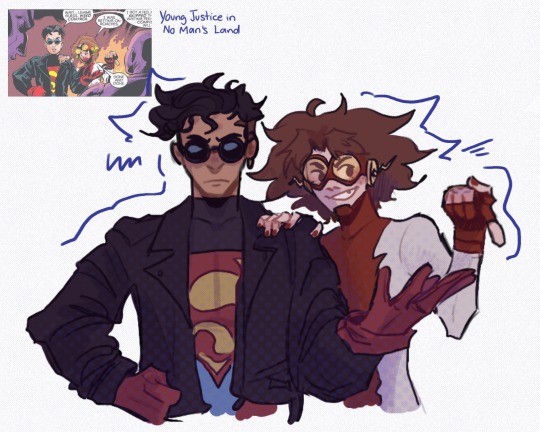
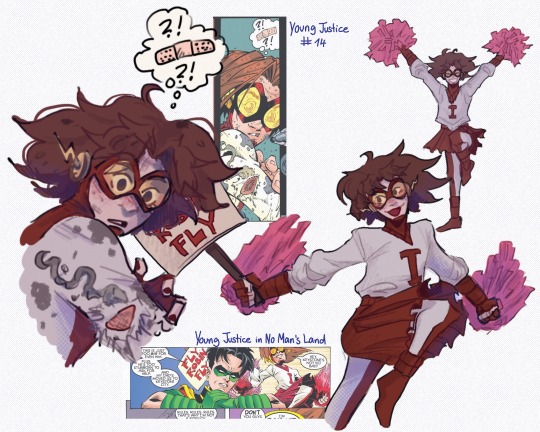
some panel redraws with young just us
#young justice#dc comics#tim drake#kon el#bart allen#robin (tim drake)#superboy#impulse#my art#digital art#I'm having so much fun with these#finally getting a use out of my big ass comic panels folder#also you're so welcome for the issue numbers because I just screenshot panels while I read without noting them down anywhere#so I had to search through all the pages again orz orz#also I know Bart in that cheerleader uniform was meant to be a ha ha funny joke moment but I think he would rock that whenever
2K notes
·
View notes
Text
pokemon fans after explaining to arceus (gamefreak) why their fave should be the next character to experience indescribable trauma, severe memory loss, separation from friends/family, and most importantly a surge in angsty fanworks:
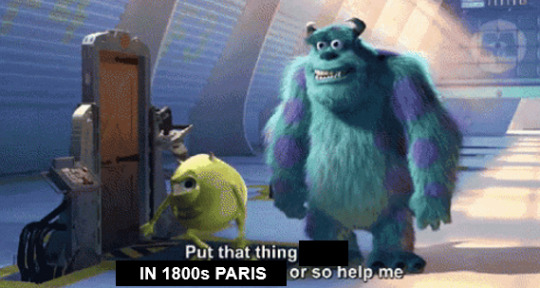
[ID from alt: an edit of the "put that thing back where it came from or so help me" meme from Monsters Inc, where the caption has been changed to: "Put that thing in 1800s Paris or so help me". End description.]
#pokemon#pokemon legends za#this is about me i'm pokemon fans#if it's not a frontier brain i want it to be gladion or lillie. bc it would emotionally ruin me for the rest of my life and i crave that#obviously i'll eat it up if it's emmet though. gamefreak has the potential to be so funny
1K notes
·
View notes
Text
Ultimately the resolution of Jason and Cass fights comes down to the fact that while he has his own ideals that don't mesh with the bats, Jason can be flexible. DC skipped the whole reconciliation with the family but while he's willing to kill it's generally a means to an end to him, not the whole entire point unless you're talking about Joker. Meanwhile for Cass the question of killing vs not killing is dead serious to her which means any time they're working together and things start going off track it's like:
Jason: Look if we kill this guy we send a message to his boss which makes it easier for us to negotiate with him from a position of power and I just think that-
Cass, snatching one of his guns and pointing it at her own head: Go on, pull the trigger. Kill him. Kill me. Go tell Batman that you let his daughter die to make a negotiation easier. He already let you die so no problem right? You think we should die? You think our life only worthwhile as part of a plan, just because we're killers? Are we doomed? Are we rotten to the core with no hope of redemption? Go on then, kill us and kill part of your soul alongside it. You clearly don't care for it so why are you even trying? Kill yourself along with us, come on Jason let's all just die right?
Jason, slowly backing away: I think you may be projecting a tiny bit so just. Calm down before I call the suicide hotline please.
Cass, slowly lowering the gun and knocking the random henchman unconscious: Yeah that's what I thought, fucking pussy.
Jason: Mm yeah you know what I hate you actually. Fuck this mission I'll just shoot you right now if you're going to be this annoying about it.
Jason, explaining things later to Dick: So I just kept shooting at her until I ran out of bullets and we both calmed down enough to call a truce. We tracked the guy down and didn't kill anyone but I did blow up the batplane just as a last minute screw you. Is she always this uh... intense?
Dick: Yeah, one time I broke up with Barbara and she threw me out a window. She's just like that.
#dc#cassandra cain#jason todd#batfam#dc rambles#dick grayson#it's so funny how jason is like. a mass murderer. and yet he's more of a team player than cass#like yeah he's violent and unpredictable but if you're on the same team with the same temporary goal then you've got decent chances#meanwhile the entire team could be seconds away from dying with the only solution being to kill a guy with a bomb#and if you're on the team with cass she'll spend the last few seconds punching you in the face for trying to kill the evil guy#then disarming the bomb because she's just that annoying#I love her very much <3#i'm jason posting a lot recently sorry jtodd stans for clogging up his tag#I just like the thought of jason dealing with a mini bruce that has none of the baggage of being his dad#so it's just the experience of ramming his head into an annoying brick wall with zero catharsis of confronting your shitty father
730 notes
·
View notes
Text
I do think Blazing Saddles handled its one depiction of native americans very poorly, and the full extent of its representation of chinese workers on the railroad is they were literally just there. not even one single speaking line. unclear if this is worse or better than the redface.
it's fucking phenomenal at lampooning antiblack racism though. extremely blatant, extremely funny satire, which is constantly and loudly saying "racism is the philosophy of the terminally stupid at best and morally depraved at worst, and we should all be pointing and laughing at them 24/7"
plus the main character is a heroic black man who has to navigate a whole lot of bullshit but is constantly smirking at the extraordinarily stupid racists and inviting the audience into the joke. the one heroic white character is a guy who was suicidally depressed until he met the protagonist and they just instantly became buds, and he's firmly in a supporting role the whole time and happy to be there. the protagonist saves the day with the help of his black friends from the railroad, and uses the position of power he was given to uplift not only those friends, but all the railroad workers of other minorities too, in an explicit show of solidarity.
anyone saying "Blazing Saddles is racist" had better be talking about its treatment of non-black minorities. it had better not be such superficial takes as "oh but they say the n-word all the time" or "they have nazis and the kkk in there!" because goddamn if that's the full extent of your critique I very seriously suggest you read up on media analysis. there is too much going over your head, you need to learn to recognize satire.
#blazing saddles#finx watches tv#finx rambles#I recognize that I'm saying all this as someone who's not black#but I am also saying it as someone with a basic understanding of race relations in the usa#and a basic understanding of sarcasm#bc it really does not take more than that to recognize what they're doing in this movie#it is NOT subtle#and it is very funny#mel brooks movies are kinda hit or miss for me ngl#men in tights is great if a bit too crass for my taste#spaceballs has great jokes but the central story lacks any real heart so it doesn't grab me#history of the world was just kind of unpleasant and then I switched it off#but blazing saddles? phenomenal#I could not stop laughing the whole way through#and the central story DOES have heart bc it's the friendship between bart and#whassisname#jim#the Kid#plus bart working out how to succeed at an impossible task#also frankly cleavon little just grounds the comedy really well even before gene wilder shows up and we get their chemistry#bc he's cool calm collected and constantly inviting the audience into the joke#but the character's not too cool to ever mess up or ever be silly#he makes bad choices and gets into bad situations and then has to get himself out of them#but it's.....oh wait duh there's a term for this already#he's the straight man#he grounds all the zany nonsense by being in strong contrast to it#and he does a great job of it!#anyway#point is I deeply enjoyed this movie and I'm glad I finally watched it
1K notes
·
View notes
Text
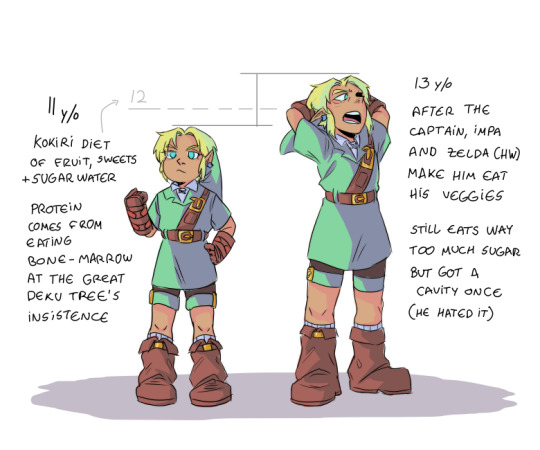
Just a bit more about my HC for this lil' guy
#linked universe#lu mask#oot link#mm link#young link#time travel shenanigans#mask got a growth spurt (has conflicted feelings about it)#growing up with eternal children and fairies was not good for his diet#also funny bc his saving grace was probably the marrow. some people eat it. i'm people#trees will devour bones btw so that tracks too#tbh the hw people didn't notice at first bc they were focusing on the war#but once Mask moved into captain Link's tent it was a matter of time for them to notice how badly Mask's diet is#tloz#tloz fanart#my art#the bone marrow is from the wolfos. which is funny if you think about Twilight
1K notes
·
View notes
Note
Can you draw something with Doom Patrol!Edwin and Netflix!Edwin?
Maybe something about Dp!Edwin talking about his feelings for Charles with N!Edwin?
It's just something I've been thinking of, make it a little angsty?<3
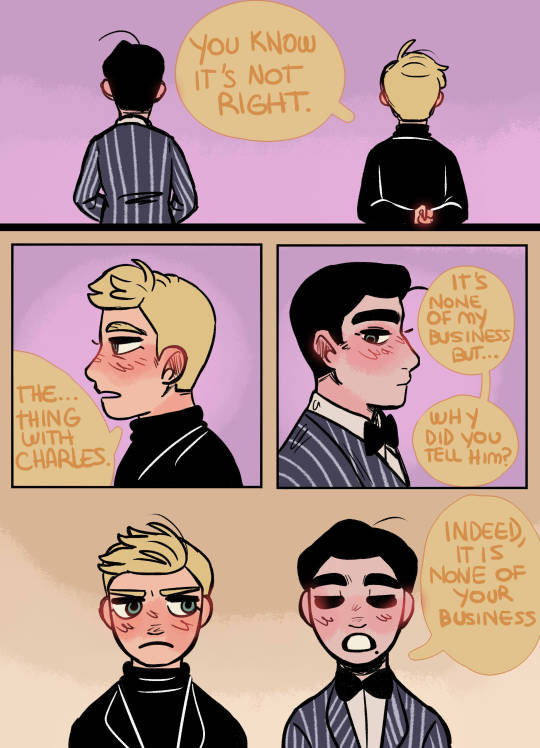
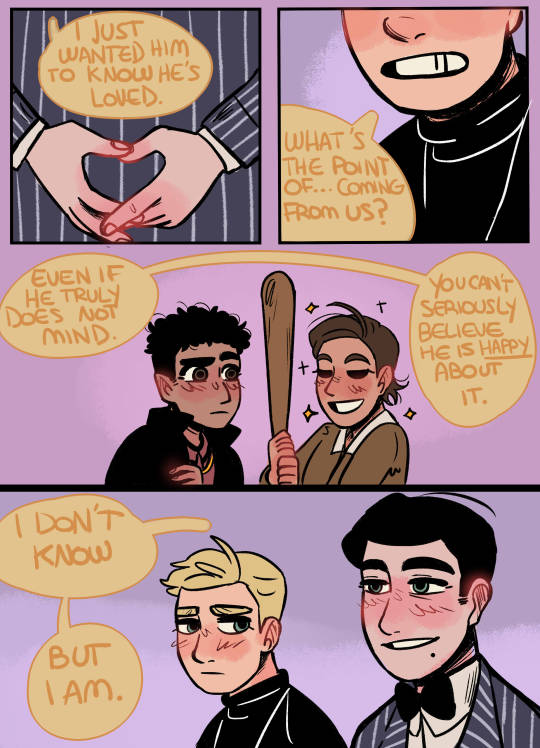
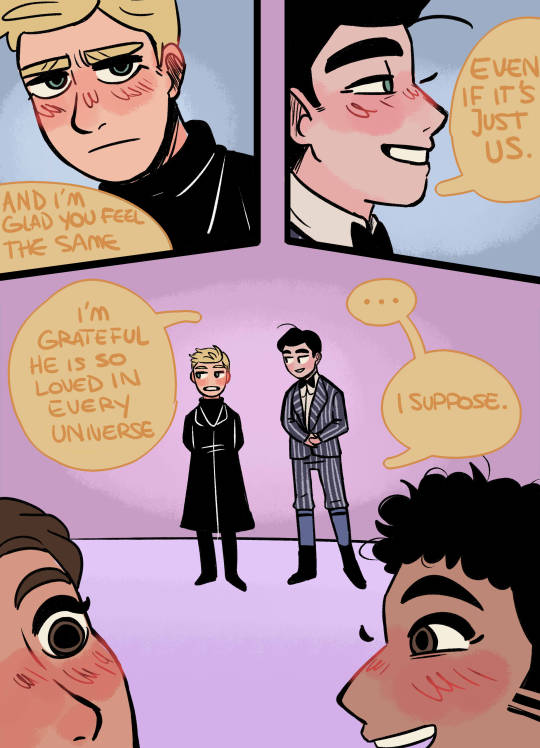
Glad you asked
ko-fi
#ask ask ask#dead boy detectives#dbda#payneland#edwin x charles#doom patrol#dead patrol#cw homophobia#i know there are a couple of people who enjoy my rambly tags so these are for u#first of all anon i'm sorry i used your request to continue my story lol#most of my comics are meant to be standalones BUT#the doom patrol and dead girl detectives are all happening in the same universe#and there is indeed series of events here!#this particular one is happening after dp!edwin's feelings were exposed but before they met the girls#with that out of the way#i know this is not as funny as most of my stuff#but dp!edwin's internalized homophobia is an important thign that can't just go away because his charles loves him back#and he does love him back! in this verse#dp!charles is the only one not struggling with his feelings for his partner#dbd!charles and charlotte still have ways to go#also dbd!edwin is in no way an expert in self-acceptance but he has learned some things#i considered having him mention simon but i decided it wasn't his place to out him#(even though he's dead u know)#so yeah what he says here isn't... great#he's still putting himself down and he's still not sure if his feelings for charles are actually a good thing#but he knows HE is glad he feels this way#because fuck it it's not like he'll go to hell for it#and even if he did... he would crawl his way out
658 notes
·
View notes
Text
sorry i was gone for a while i just got back from the mountains

#so my body crashed and burned while I was in the mountains#isat#isat odile#in stars and time#day 111#or something i forgot#ok it Has been almost a week now since I got back but it's a funny way to format a return post of sorts#Anyways sorry for literally not posting anything for 2 weeks! It's been a stupidly busy month#I'll still be busy for the rest of this month unfortunately but I'll still try to post something from time to time#in the meanwhile. odile gets a vacation. and a bit of my suffering along the way#edit: I should clarify that I'm alright now!! T'was just a weird few days lemme tell ya.#mayhaps 3 12 hour shifts right before a mountain trip was not the best idea (remember to do exercise sometimes guys...)
923 notes
·
View notes
Text
Sorry if some of these overlap a little/if I left out something obvious kajbdsjkd I tried my best haha. And that's why there's an "other" option!
#coffeebanana polls#personally i think i'm good at writing emotions!#and that's funny to me because growing up i was very much not an emotional person#i had to sort of learn to value emotional intelligence as opposed to pure logic. and i probably repressed some things kjabdfskj#so i'm proud that emotions come through in my writing!#fiction has always been something i can use to connect emotionally even when i struggled doing that irl#and i think that's really cool#anyways i'm looking forwards to seeing what you all love about your writing!!!
9K notes
·
View notes
Text

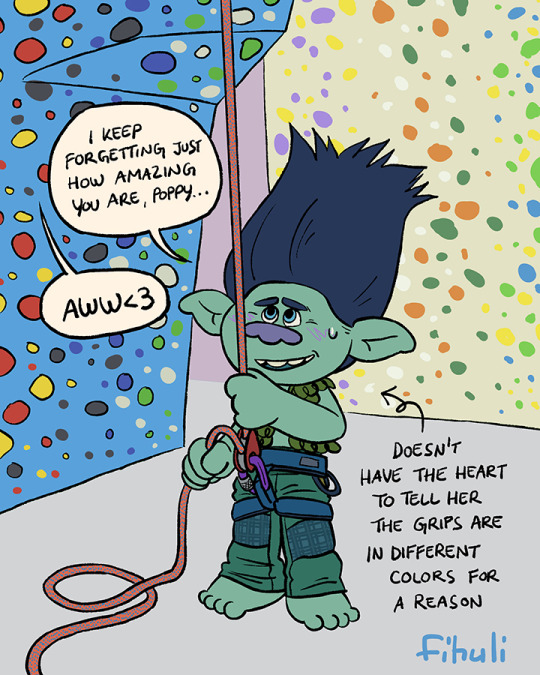
started going wall climbing with my brother recently and it's so much fun! i used to do it as a kid but stopped because i was super short, dunno why i never picked it up again...
anyway i kind of imagine these two would do that too, like a fun date, especially in a human au scenario, although i drew them as trolls because i've realized i haven't drawn them much at all
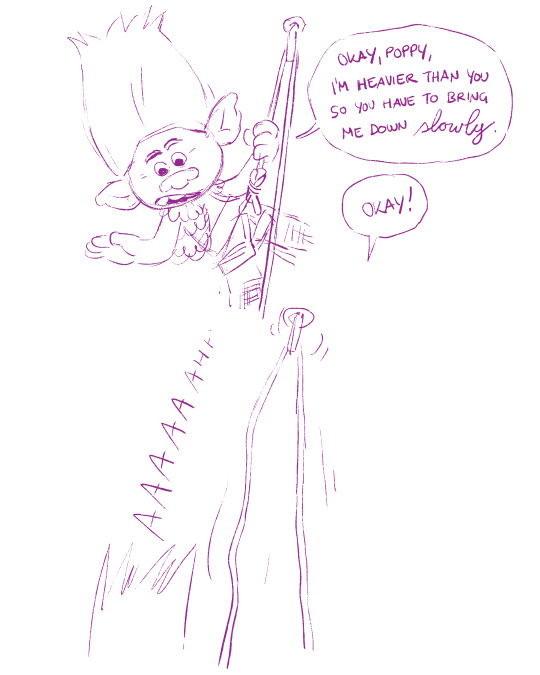
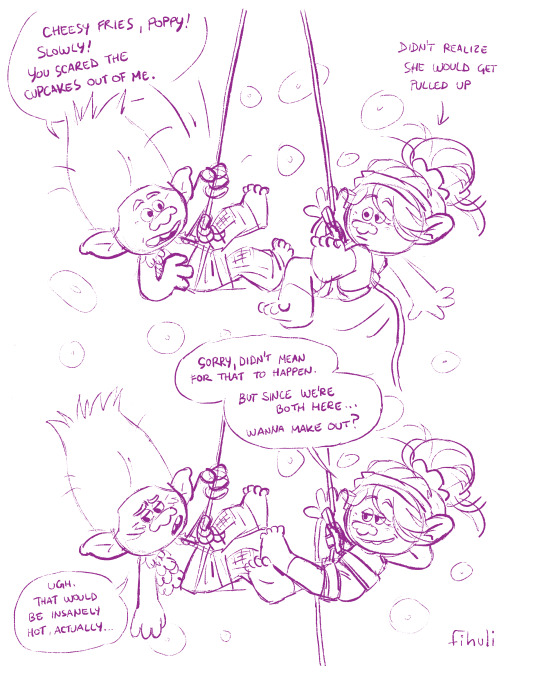
#JD gave him the idea for the date just saying#branch owes his bro that manly bonding trip into the wild JD has been asking for them to go on#trolls#dreamworks trolls#broppy#trolls branch#trolls poppy#my art#wall climbing#i'm much lighter than my brother so whenever i let him down too quick and then stop i get yanked up and almost land with my head in his ass#it's actually very funny#drew the equipment from memory because i can't be bothered#cheesy fries is supposed to sound like jesus christ#i tried
2K notes
·
View notes
Text

Normal Friend Behaviour.
[First] Prev <–-> Next
#poorly drawn mdzs#mdzs#wei wuxian#lan wangji#lan xichen#Ring ring! It's your judgment call! None of the lan brothers are there to pick it up!#Lan Xichen is so openly like 'I trust Jin Guangyao so much! Our bond is so deep! I believe in him like you believe in wwx!'#The tension! I remember not knowing how this would go because woagh the red flags for betrayal were so strong here.#Now I have spoiler brain so I mostly see the heartbreak coming but I still remember the anxiety of thinking lxc would betray lwj.#The way LXC compares his relationship to JGY is so funny to me. They aren't technically canon but...like....come on.#LXC *also* lets on that he knows LWJ has feelings for WWX. The implications are the loudest subtext I have seen.#Personally I see it as romantically one-sided on LXCs side. I think JGY knows and LXC denies his heart.#I think the tragedy is that JGY can't move past his need to make everything a game of chess to see LXC as more than an oppertunity#Here's the bigger tragedy: The one time he followed his heart...it led him to Qin-Su. Whom he loved dearly!#but...oh god was that ever a massive disaster that must have been internalized as 'following my heart is a mistake I can never make again.'#Ah - Happy Puffy Sleeves WWX debut day! We finally made it!#I'm personally a fan of the happy accident of WWX having white sleeves for this arc B*)
2K notes
·
View notes
Note
i love your riddle design so much, he's so pointy and british. so gracious. do you think he would enjoy a brazilian goiabada
thank you! ❤️🖤❤️ it's just. important to me on a level I can't explain that Riddle have an extremely pointy nose that he can stick into everyone else's business.
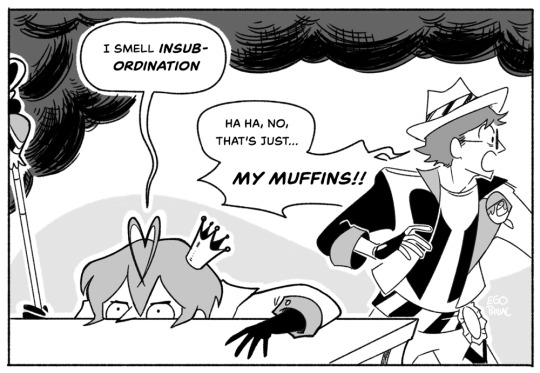
also goiabada is sweet and fruity and red, I think he would like it very much indeed!
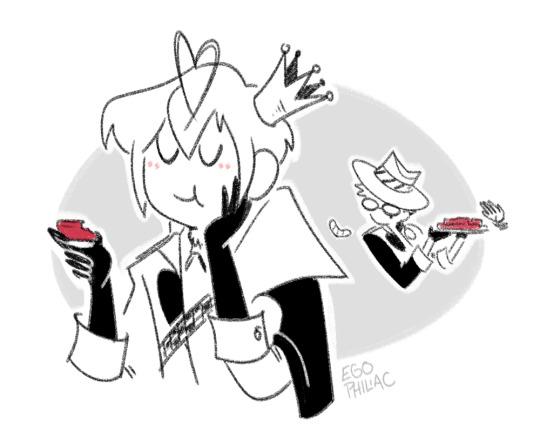
not me stealth-editing because I forgot his antenna whoops
#art#twisted wonderland#me: riddle's nose is important to me (draws him without a nose)#a study in contrasts?#regardless it is my power as a fanartist to let riddle eat sweets and by god i'm going to use it#i also love british riddle. briddle. it's just RIGHT.#i think about how someday the anime will come out and get dubbed and riddle is going to have Generic Anime Boy Voice#instead of the most over-the-top prim little benedict cumberbatch accent like he does in my HEART#and the world shall be poorer for it. alas.#i also think it would be VERY funny if malleus had a super exaggerated french accent because something something french fairytale#i am probably alone in this however#(sorry still trying to catch up on everything!)#(all of my focus has been going towards Deadlines so hopefully i will have space to think...eventually :')#(i still have some main story things cookin' and i JUST finished tsumsted 3: the squeakquel so uhhh)#(there may be a bit of a flood at some point. you've been warned.)
3K notes
·
View notes
Text
Totally random but this shot always makes me crazy:

This one, too:

I've rewatched this damn show like 50 times or more at this point and still I find myself always watching Charles even if he isn't the "focus" of the scene because not only is he always lurking and observing but he's also REACTING. Like, full face reactions at all times.
Oh to be a fly on the the wall of Charles Rowland's mind...
#Charles Rowland please share your thoughts with the class bby#because you obviously have some thoughts lmao#I have thoughts but I don't have the energy to do a full analysis rn#but ya'll get what I'm trying to say right?#Something something Charles is so expressive with his actions but keeps his thoughts and feelings close -#to his chest#anyway it's funny that Edwin has the big confession because Charles is down bad imo but I digress#dead boy detectives#dbda#charles rowland#edwin payne#payneland#the dead boy detectives#dead boy detectives netflix#dead boy detective agency#renew dead boy detectives#dbda netflix#jayden revri
901 notes
·
View notes